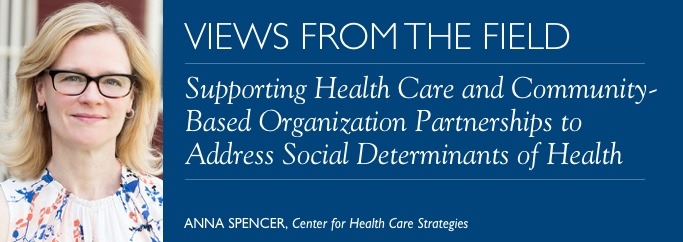
Anna Spencer, Center for Health Care Strategies
Increasingly, health systems, providers, and payers recognize the significant influence that social factors such as housing, food insecurity, employment status, and transportation have on well-being and health care spending. These social determinants of health (SDOH), in addition to health behaviors, influence 80 percent of health outcomes in the United States, and disproportionately affect low-income populations (Hood et. al. 2016). As reimbursement models transition away from fee-for-service to value-based payment, there has been a greater focus on innovative models of care that integrate medical and nonmedical services to improve health outcomes. Such demonstration projects include: Accountable Health Communities (an effort by the Center for Medicare and Medicaid Innovation to test whether identifying and addressing the social needs of Medicare and Medicaid beneficiaries can reduce health care costs/utilization); accountable communities for health (state-led cross-sector efforts to improve population health); and accountable care organizations. While these models differ in scope, structure, and target population, they generally rely on establishing a new breed of partnerships between health care and community-based organizations.
These emerging alliances between health care (HC) and community-based organizations (CBO) have the potential to better address the medical and social determinant needs of the clients they serve. As trusted members of their communities, CBOs have established relationships with various community resources, as well as experience addressing social supports, such as housing, nutrition, and transportation, which are lacking among many hospitals and health care providers (Blair et. al. 2019). To that end, hospitals have increased the rate at which they screen for SDOH and are developing referral mechanisms to connect high-risk and vulnerable patients with social service providers that specialize in addressing nonclinical needs.[i] (Healthify 2019) These mutually beneficial relationships have the potential to improve outcomes for patients, address the persistent health inequities that exist, and potentially reduce the cost of care (Healthify 2019).
The Center for Health Care Strategies, in partnership with Nonprofit Finance Fund and with support from the Robert Wood Johnson Foundation and Kaiser Permanente Community Benefit, undertook a national scan of promising HC/CBO partnerships and developed a series of case studies and tools that examine the operational, financial, and strategic components of successful partnerships. Several lessons emerged from this body of work, including:
- Partnership models. Partnership models exist along a service continuum. A referral service model involves partners linking clients to services, or providing clients with information about needed partner services. In a coordinated service model, partners coordinate delivery of a complementary set of services for shared clients. Joint service models involve the co-location of partners or jointly staffed programs where partners work together to strengthen care and service linkages (Nonprofit Finance Fund and Center for Health Care Strategies 2019).
- Shared Goals and Purpose. A shared mission or goal often drives the creation of HC/CBO partnerships. Most frequently, partnerships address patient-level, clinical needs, such as reduced hospitalizations or improved transitions of care from acute care to community-based settings. Partners often leverage existing relationships, but also devote significant resources to further align shared efforts.
- Agreements. Most partnership have formal agreements in place (i.e., memoranda of understanding or business associates’ agreements) that detail how client information will be shared, how services will be coordinated, how the partnership will be staffed, and how services will be integrated. In some case, partnership agreements detail how health care organizations will refer to CBOs for specific services, and how these services will be reimbursed.
- Funding. Partnerships often rely on a variety of funding sources, including philanthropic and government grants, donations, in-kind services, Medicaid reimbursement, and in some cases health care organizations are contracting directly with CBOs to deliver specified services. Grants often launch the creation of a HC/CBO partnership, however identifying a source of long-term sustainable funding remains a challenge for most.
- Data Capacity. Data is required to understand the partnerships’ value and effectiveness. Most partnerships have data-sharing systems in place and share, at a minimum, patient-level utilization data.
- Evaluation. Evaluating partnership processes and effectiveness is critical to ensure ongoing support for partnership efforts. Identifying metrics and reporting mechanisms to enable evaluation is important, but often challenging.
- Community Ecosystem: HC/CBO partnerships can be mutually beneficial for both partners and can be part of a broader community effort to address health disparities and improve population health. HC organizations can leverage the trust that CBOs have within their communities and their expertise at making connections to needed social services, while CBOs can look to health systems to refer at-risk patients and provide infrastructure support.
A Role for Philanthropy
There is growing enthusiasm about accelerating and scaling up HC/CBO partnerships to address social needs, and philanthropy can help in several ways to support the development, refinement, and sustainment of these relationships.
- Evaluation. Given that CBOs are often not accustomed to formal data collection and reporting, an investment in data capacity – including systems and staff – is essential to show progress toward program goals (Freda et al 2018). Demonstrating return-on-investment and program effectiveness is crucial for sustained support of any partnership; however, reaching consensus on outcomes and reporting processes is time-intensive and complex. Providing support to develop measurement approaches, implement data collection processes, and conduct analyses would help partners rigorously evaluate the impacts of their work.
- Developing a Business Case. Making the case for partnership requires upfront relationship building and evidence to demonstrate effectiveness of making social referrals. Philanthropy could help support educational efforts to support health system and provider buy-in, as well as value propositions for partnering entities.
- Contracting Support. CBOs are often not well versed in negotiating contracts with health care organizations. Providing technical assistance around contract development and program monitoring requirements would be helpful to both CBOs and HCs. In addition, many CBOs will need up-front capacity-building support to strengthen staff skills, expand bandwidth, and develop financial acumen to understand true partnership costs in order to negotiate reasonable contracts with health car partners.
Partnerships between health care and community-based organizations can effectively address the complex health and social needs of patients. These collaborations, however, are a new way of doing business and in order to ensure their success, as well as their scale and spread, there are several areas that require investment. Philanthropy has an important role to play in supporting these activities, such as funding formal evaluations of outcomes and cost savings to supplement largely anecdotal findings on success to date; helping to build and communicate the business case for partnership; and developing CBO’s capacity to estimate program costs and negotiate contracts with health care partners to ensure these relationships are sustainable and mutually beneficial.
References
Blair, Elizabeth, Kaschak, Mary, Super, Nora. “Health Care And Community-Based Organizations Have Finally Begun Partnering To Integrate Health And Long-Term Care,” Health Affairs Blog, February 2, 2018.
Freda, Bianca, Kozick, Deborah and Spencer, Anna. Partnerships for Health: Lessons from Bridging Community-Based Organizations and Health Care Organizations. Blue Cross Blue Shield Foundation of Massachusetts and Center for Health Care Strategies, January 2018.
Healthify. Incentivizing Collaboration Between Healthcare Organizations and Community-Based Organizations. January 10, 2019.
Hood, Keith P. Gennuso, Geoffrey R. Swain, Bridget B. Catlin, County health rankings: Relationships between determinant factors and health outcomes. American Journal of Preventive Medicine 50(2016):129-135.
Nonprofit Finance Fund and Center for Health Care Strategies. Integrating to Improve Health: Partnership Models between Community-Based and Health Care Organizations. January 11, 2019.

